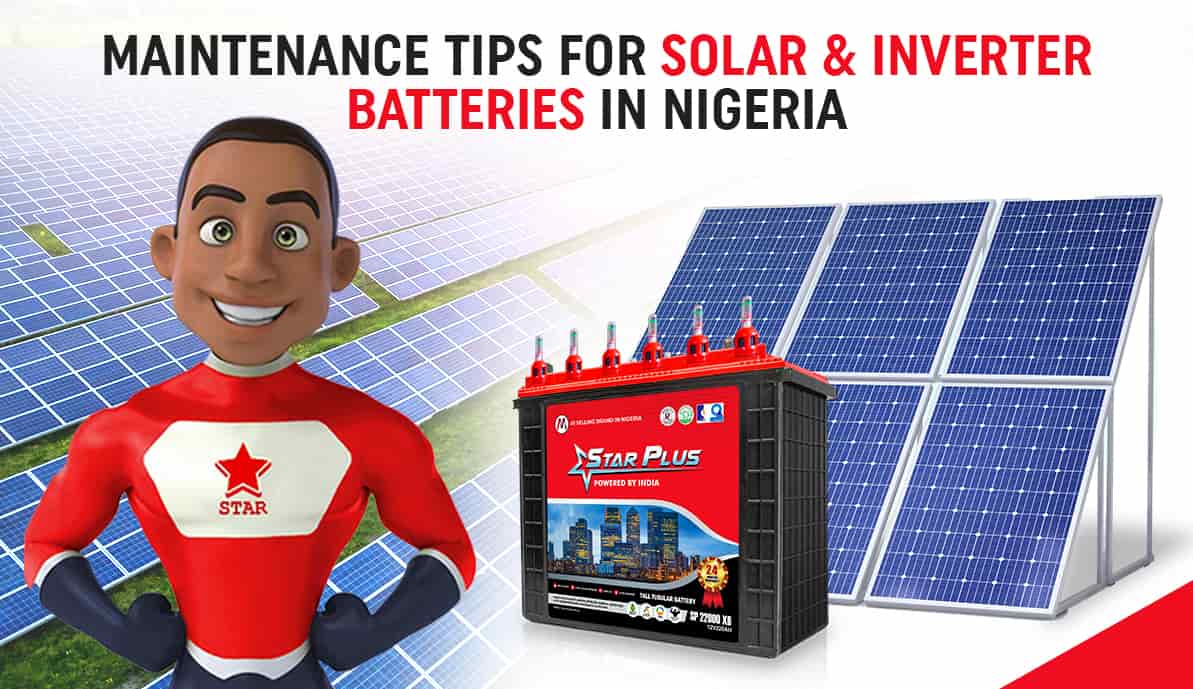Ensuring the longevity of your solar and inverter batteries is crucial for maintaining smooth operation over an extended period. Maintaining your battery periodically is vital to prevent sudden breakdowns. But how to maintain? We have compiled some easy-to-follow maintenance tips.
Explore this blog for a comprehensive overview of inverter battery maintenance in Nigeria. Continue reading to know more.
How do I maintain my inverter battery in Nigeria?
Not every maintenance task requires complex steps, but some can be completed very easily. Here’s how you can maintain your inverter battery in Nigeria.
1. Optimal Temperature Conditions
Inverter batteries used in homes perform optimally in a specific temperature range. Extreme temperatures can impose pressure on the functioning ability of an inverter battery.
As an inverter battery owner, you need to maintain the temperature levels of your storage area. If possible, install a thermostat in your store rooms to maintain room temperature in extreme weather conditions.
Proper ventilation throughout the storage area can help maintain a stable room temperature and prevent your inverter batteries from overheating.
2. Ensure Water Topping
You need to ensure that your lead-acid inverter battery is topped off with water. Water levels inside the inverter batteries may get lower. Once they reach a certain level, acid from the batteries may leak and corrode the positive battery plates.
If you own an inverter in Nigeria, you can install a water scale measurer to check the levels at each interval. As part of Star Plus Battery maintenance, we ensure that our inverter batteries have a high storage capacity, reducing the need for frequent water topping. You can prevent corrosion on your inverter batteries and conserve water.
3. Keep Terminals Clean
Inverter battery terminals are susceptible to rust and corrosion, which reduces the power flow capacity. The restricted electricity flow can cause low charging and reduce the lifespan of an inverter battery.
Make sure that your battery terminals are clean. We suggest the most straightforward approach: use a toothbrush to clear the initial dust deposition. This will prevent heavy blockages in the later stages.
4. Avoid Deep Discharging and Overcharging
Deep discharge occurs when an inverter battery reaches its threshold. Consumers may often need clarification on overcharged inverter batteries. Try to avoid this misconception.
Our high-powered inverter batteries are designed to withstand deep discharge cycles. You can also use an automatic charging method. Check if your inverter battery is fully charged before using it again.
5. Hire Professional Inspection
If you are still unsure about how to maintain batteries in Nigeria, consider hiring a professional battery inspector. A professional inspection is always the best choice for ensuring a longer lifespan of inverter batteries. An expert will identify and rectify potential issues before minor problems become severe.
What is the best way to charge solar batteries?
The best way to charge solar batteries is to choose a charge controller to ensure optimal charging and prevent overcharging. Here’s how you can efficiently charge your solar batteries:
- Choose the right charge controller.
- Properly connect the charging components.
- Monitor the charging process due to overcharge or undercharge.
- Regularly maintain by securing storage, removing rust deposition and identifying water levels.
How often should I top off the inverter battery’s water level?
You should check and top up your inverter battery’s water level every 1–3 months, depending on power usage and environmental conditions. Maintaining the electrolyte at the correct level ensures smooth chemical reactions and prevents the internal plates from drying out.
Here’s hoping you can safely top up:
- Check water levels every 1–3 months.
- Only distilled water should be used.
- Prevents plates from drying and damage.
- Helps maintain efficiency and performance.
- Avoids overheating and premature failure.
- Ensures long-term reliability of backup.
Can poor maintenance reduce battery lifespan?
Properly following solar battery care tips can significantly increase the lifespan of your battery. A well-maintained battery, however, runs efficiently, lasts longer, and reduces repair expenses. Consistent upkeep, including regular water refills, clean terminals, and proper charging, ensures maximum backup hours and extends the battery’s overall operating life.
Conclusion
The rising demand for inverters in Nigeria enhances the need for high-powered inverter batteries. At Star Plus Battery, we offer the best inverter battery installation and maintenance facilities. Our high-storage inverter batteries can withstand temperature fluctuations and maintain performance quality over time.
Just like your home needs a consistent power supply, your inverter battery requires constant care to deliver optimal performance. Are you facing any maintenance problems?
Let us help you with professional inverter battery maintenance, installation, repair and replacement.



0 Comments